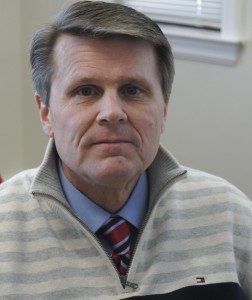I think it is somewhat ironic that we call it “Black Friday.” I get it. It’s the day retailers hope to sell enough stuff that they will end the year in the black. For me, it’s simply the day we celebrate all the things that are wrong with our culture. It’s a sad, dark, black spot on an otherwise joyous season.
So this year I was surprised when my wife told me she wanted to do Black Friday. I grumbled, and she looked at me like I was Scrooge. And off we went. I won’t identify the store we hit first. Suffice it to say, we were there before the doors opened, somewhere in line behind nearly 250 other people who all looked pretty eager to work off the turkey they had consumed only hours earlier.
Then, all of a sudden, the line surged, forming a tsunami of shoppers with money to spend and deals to find. I became one of them, bodysurfing my way through the waves of outstretched arms grabbing at the glittery displays. We quickly claimed our door-busting bounty and then stood in line again, this time waiting to pay. 
I’m still thinking about what happened next. A man was working his way through the crowd at the checkout line, telling each of us his sad story. His nephew, he explained, absolutely needed one of the high-tech gizmos that seemed to be among the most popular doorbusters this year. What had been a mountain-sized display was now gone, leveled in only minutes. Would anybody, he asked, please be willing to give up one of these prizes for his nephew?
Just for the record, we didn’t have one of the gizmos in question, but his plea started an argument in the line. The family waiting right ahead of us clutched tightly to several of what had now clearly become a cherished treasure. One of the children, obviously remembering one of those primary lessons about charity and kindness, proposed they share. To my surprise, her mother snapped back angrily and drew the colorful box even more tightly to her chest. Sharing wasn’t an option. The man begged again. Christmas music played in the background.
We were lucky, I suppose. No fights broke out, and no one was trampled. But the poor man left empty handed. Somehow, I was struggling to feel holiday cheer. Other places have not always been that lucky. Two years ago a California woman pepper-sprayed 20 fellow shoppers in the wee hours of the morning to make sure she could secure a new Xbox. A year ago two people were shot in a Florida Walmart during a fight for a parking space. This year two people were knocked to the ground and at least one woman was stepped on in a scuffle over a $49 tablet computer at a store in Clinton, Ut.
The expression “Black Friday” was actually coined by the Philadelphia Police Department. The guys that keep watch over the City of Brotherly Love used the term to describe the traffic and congestion that accompanied the post-Thanksgiving Day sales downtown. It remained a local term for a long time before it was used elsewhere, before it was co-opted by retailers concerned about their bottom lines and before it was used by people in my own profession who saw it as a good story line.
I probably didn’t actually hear the term used until about 10 years ago, which makes sense. According to the Center for the New American Dream, Black Friday has been the biggest shopping day in the world since 2003. Now it’s actually several days, running from Gray Thursday, or whatever we call it, to Cyber Monday. Here in the U.S., shoppers spend more than $57 billion during the Black Friday weekend alone.
Those shoppers used to have to wait until 6 a.m. on Friday for most stores to open. Then someone had the bright idea to open at midnight. This year, our obsession for the cheap deal went one step further, with many stores opening Thanksgiving Day and Thanksgiving evening. The fact that we can’t seem to resist saving ten bucks at 2 a.m. means, of course, that legions of underpaid Walmart, Kmart, Target and Toys R Us employees had to give up their holiday so we could shop.
I’m pretty sure that in 1863 when Abraham Lincoln called for a national day of thanksgiving to be held each November, he didn’t envision a special weekend for greedy shoppers to fight over stuff that would probably be broken or discarded before we even got out the decorations for St. Patrick’s Day.
Maybe we should remember what he said. Even though the nation was in the midst of a civil war, President Lincoln saw the divine hand of mercy guiding the troubled nation. He called upon us to use the day to solemnly, reverently and gratefully acknowledge the beneficence of our Heavenly Father and to implore Him to heal the wounds of our nation that we might enjoy peace, harmony and tranquility. After what I’ve seen at Black Friday, we should add charity and civility to that list.
Honest Abe got that one right. Maybe we should, too.
Steve Thomsen is a professor in the Communications Department at BYU.




